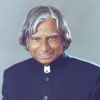Abdul Kalam

Abdul Kalam
Avul Pakir Jainulabdeen "A. P. J." Abdul Kalamwas the 11th President of India from 2002 to 2007. A career scientist turned politician, Kalam was born and raised in Rameswaram, Tamil Nadu, and studied physics and aerospace engineering. He spent the next four decades as a scientist and science administrator, mainly at the Defence Research and Development Organisationand Indian Space Research Organisationand was intimately involved in India's civilian space program and military missile development efforts. He thus came to be known...
ProfessionScientist
Date of Birth15 October 1931
CityRameswaram, India
Abdul Kalam quotes about
My government is committed towards creating such an environment so that the latent potential of our people can blossom and create a new India of our dreams.
Today, India consumes about 682 watts per capita, far lesser than developed nations. As India develops, it will definitely require a lot more energy.
For 2,500 years, India has never invaded anybody.
In India we only read about death, sickness, terrorism, crime.
India should walk on her own shadow - we must have our own development model.
India has to be transformed into a developed nation, a prosperous nation and a healthy nation, with a value system.
Our nation is facing a major challenge of uplifting 260 million people who are below poverty line and we have to give better life for many millions who are on border line of poverty or just above the poverty line. To meet the needs of one billion people we have the mission of transforming India into a developed nation .... We have identified five areas where India has a core competence on integrated action for agriculture, food processing, education and health care, reliable and quality electric power, surface transport and infrastructure for all parts of the country, information technology and other strategic sectors.
We are firmly committed to helping Mauritius overcome this temporary phase and India can be a partner and can fully share its experiences, particularly in the areas of sugar and textile with you.
While condemning this inhuman act, nations have the collective responsibility to device a mechanism to see that such situation do not occur in future for any citizen of India and also any person belonging to any part of the world.
The rapidly growing Indian economy provides new and significant opportunities for partnerships between our two countries in a variety of sectors, including energy, infrastructure, manufacturing, environment and food processing.
On behalf of the Government and people of India and on my own behalf, I would like to convey to you and to the people of Pakistan our heartfelt sympathies.
All the scientists and technologists should work in appropriate region, specifically the rural technologies, to transform Indian rural sector.
When I took over as president, I studied the Constitution, and the more I studied it, the more I realised that it does not prevent the president of India from giving the nation a vision. So when I went and presented this vision in Parliament and in legislative assemblies; everyone welcomed it, irrespective of party affiliations.
Unless India stands up to the world, no one will respect us. In this world, fear has no place. Only strength respects strength.